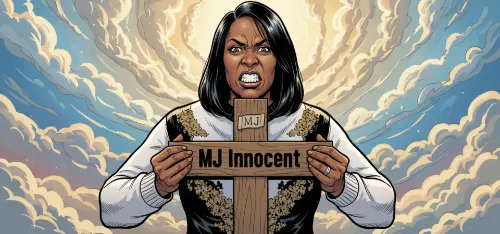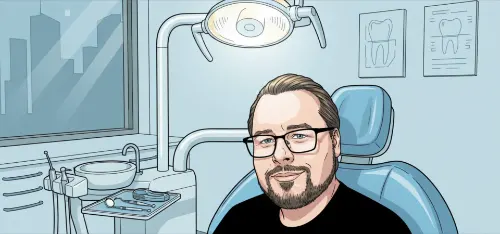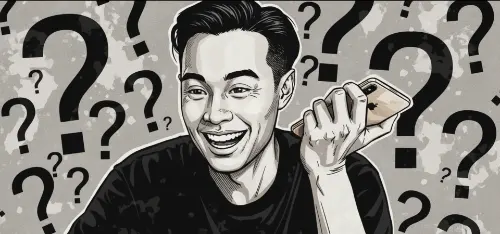The Truth Behind Anthony Pellicano’s ‘Extortion’ Tape

Oct 30, 2020
The documentary Square One begins with the introduction of Josephine Zohny, a vocal Michael Jackson supporter who claims to have attended a class at NYU alongside Jordan Chandler in the early 2000's. Unsurprisingly, she asserts that Chandler spoke highly of Jackson. However, her account lacks any independent verification, and the documentary presents her claim without scrutiny.
Soon after, the focus shifts to Anthony Pellicano and the infamous recorded conversation between Evan Chandler and Jordan’s stepfather, David Schwartz. Hearing Pellicano’s name in what is clearly a heavily pro-Jackson documentary was unexpected. I momentarily entertained the idea that Square One might at least acknowledge Jackson’s association with a deeply controversial and criminal figure.
That moment of optimism quickly faded. After nearly 20 minutes of screen time, neither director Danny Wu nor journalist Charles Thomson offers a single critical remark about Pellicano. Instead, they laud his supposed achievements: extracting an unrecorded confession from Jordan Chandler that Jackson had not abused him, and presenting a telephone conversation that allegedly demonstrated Evan Chandler’s intention to extort Jackson.
To the casual listener, the audio clip presented may sound damning. Evan Chandler is heard making alarming remarks such as:
- I will get everything I want, and they will be totally — they will be destroyed forever.
- This man is gonna be humiliated beyond belief. You’ll not believe it. He will not believe what’s going to happen to him.
Watch the clip below.
However, Square One conveniently omits key context. The tape was recorded by David Schwartz at Pellicano’s request. Far from being an isolated excerpt of criminal intent, the “extortion” tape was originally part of a heated, multi-hour conversation comprising over 35,000 words. What Pellicano handed to CBS News was a manipulated 60-second clip, stitched together from emotionally charged segments where Evan expressed anger towards Jackson and Jordan's mother, June Chandler.
CBS initially failed to disclose the tape’s origins or its recording date—July 1993, a full month before any police investigation into Jackson. This misrepresentation was highlighted by the LA Times, prompting CBS News to issue a clarification on 31 August 1993: their story of extortion was, in fact, false. Crucially, there is no mention of money anywhere in the tape.
Watch the clip below.
Despite his visible lack of expertise, Wu frames Charles Thomson as an “award-winning” investigative journalist with extensive knowledge of Jackson. Thomson is even credited for helping to expose a paedophile ring in his home county—an accolade meant to bolster his credibility. Yet the documentary reveals his perspective to be glaringly selective. Both Thomson and Wu depict Pellicano as a flawless investigator who uncovered the “truth,” with no discussion of his actual character or criminal past.
In reality, Pellicano is far from squeaky-clean. Known as a Hollywood fixer rather than a noble truth-seeker, he made problems disappear for wealthy clients using questionable methods. Thomson fails to mention Pellicano’s 30-month federal prison sentence for possession of illegal explosives, firearms, and homemade grenades—served until spring 2019.
Even more astonishingly, the film omits Pellicano’s own admission from prison:
I quit because I found out some truths … He did something far worse to young boys than molest them.
Whether Pellicano was aware of more serious offences committed by Jackson remains debatable. Still, it’s striking that neither Wu nor Thomson addresses this deeply unsettling claim.
The irony in Square One deepens with its focus on Victor Gutierrez, a vocal critic of Jackson. The documentary highlights Gutierrez’s conviction in Chile over defamatory claims involving former Miss Universe Cecilia Bolocco—he was sentenced to 61 days in jail and fined $46,000. However, it omits a key detail: Chile has a track record of suppressing free speech, and Gutierrez ultimately received a suspended sentence rather than serving time in prison. This stands in stark contrast to Anthony Pellicano, whose far more serious criminal history is casually overlooked by the film.

Conclusion
A five-minute search on YouTube reveals a CBS News segment conceding there was no extortion attempt. Pellicano’s heavily edited audio clip was nothing more than a strategic smear against Evan Chandler. The truth is simple: extortion is a criminal offence, and despite repeated claims by Jackson’s camp, no credible evidence ever supported such accusations.
Just days before the multimillion-dollar settlement in January 1994, district attorney Michael J. Montagna stated:
We’ve declined to file today criminal charges of attempted extortion,” said Michael J. Montagna, a deputy Los Angeles County district attorney who heads that office’s organized crime unit. “The evidence does not show that any crime has been committed.
Square One aimed to present the “true” story of the 1993 case, but ultimately delivered a deeply misleading and one-sided narrative. The problems go beyond the questionable use of the Anthony Pellicano extortion tape—throughout, the documentary promotes misinformation and conspiracy theories, while trivialising the seriousness of sexual abuse by implying that Michael Jackson was simply too kind to be capable of it.



